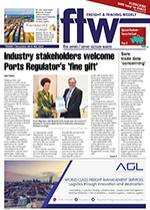Shipping lines and operators as well as local manufacturers and importers lauded the National Ports Regulator’s announcement of a 6.27% overall decrease in port tariffs as a “fine gift” and a “watershed decision” that showed the regulator had acted independently in setting prices for the industry last Friday. Ports Regulator CEO Mahesh Fakir presented the regulator’s record of decision to Transnet National Ports Authority (TNPA) chairwoman Shulami Qalinge at a public meeting in Durban attended by port users from around the country, including representatives of shipping lines, automobile manufacturers, exporters and freight operators. Fakir said the regulator had considered the TNPA’s application for a tariff increase, the written and oral submissions of all stakeholders, and the latest global data, which had led to the conclusion that an “appropriate overall adjustment” in average tariffs for the financial year 2019/20 should be a decrease of 6.27%. The new tariffs are effective from April 1, 2019/20. Fakir said the regulator was committed to reducing the cost of living and doing business in the country through fair pricing in the ports system. “We hope that this tariff correction in port administered prices will contribute towards the much-needed stimulus to South Africa’s economic growth over the medium term, noting at the same time that the reduced tariffs still prudently allow for the large infrastructure expenditure required for the acceleration of economic growth if wisely targeted by the authority towards high future return port capacity projects, local employment, local procurement and local innovation and expertise,” Fakir said. A change from a physical capital maintenance approach to a financial capital maintenance approach in the valuation of the regulatory asset base (RAB) had been a major factor in the tariff correction of -6.27%, he added. The value of the RAB had been reduced from R86 billion to R69 billion and the total calculated return on equity was R2.790bn as opposed to the R3.511bn requested, and R2.074bn had been allowed for depreciation rather than the R2.279m applied for. “For 2019/20 the NPA will be allowed to recover R12.563bn versus the R13.681bn applied for, or 92% of applied-for revenue,” Fakir said. “The regulator is confident that this will result in a 1.2% increase over last year’s allowed revenue to the NPA, ensuring their sustainability and also providing the financial space to ensure that the capital programme included in the application, totally R4.413 billion, is fully implemented,” Fakir said. TNPA had applied for an average tariff increase of 4.21% for the period April 1 2019 to March 31 2020 and indicative tariff increases of 18.57% and 6.34% for the 2020/21 and 2021/22 periods. Qalinge said the authority respected the regulator’s decision and would review the decision and adjust its strategic plan in line with the reduced revenue. “The minus 6.27% is not what we asked for but the revenue allowed gives us approximately R1.1 billion revenue decrease so one needs to go back and look at the numbers and the strategic objectives and align them. We have to work according to what we have been given by the port regulator,” she said.
INSERT


